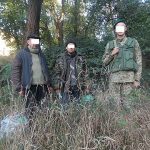Source: http://www.khpg.org/en/index.php?id=1261210012
In an interview to Oksana Klymonchuk from UNIAN, Deputy Ministry of Internal Affairs Vasyl Marmazov spoke about the agreement on readmission between Ukraine and the EU which is to come into force from 1 January 2010.
Mr Marmazov stressed that the agreement, reached on 18 June 2007, has already been in force with regard to readmission of nationals of the signatories who have infringed legislation. What is new is the part regarding readmission of nationals of a third country or stateless persons.
“I would like to stress that the law enforcement agencies of EU countries will return nationals of a third country or stateless persons to Ukraine only after they provide evidence that the people in question did in fact reach an EU country from Ukraine”.
He goes on to say that the Ministry of Internal Affairs [MIA], State Border Guard Service, can agree or not agree the procedure for readmission, and that it will not therefore take place automatically.
The relevant EU officials will need to explain why the illegal migrant should be returned to Ukraine, and not their country of origin, if the EU has a readmission agreement with this country. If it does not, and Ukraine agrees to take the person, then the Ukrainian authorities have to take measures to identify the person and his or her nationality, as well as determining his or her fate.
“There are two temporary centres for illegal migrants which were built over the last 2 years, one in the Chernihiv region (oblast), the other in the Volyn region.
These centres were mainly financed by public funding, however also with the support of the EU and International Organization for Migration [IOM].
The two centres are designed for 373 people and at present are only 70% occupied. The plan in general is to open 5-7 of such centres. Over the next two years, I think three will be built, this depending on the migration flow, as well as on the EU’s fulfilment of its commitments as per the agreement to help Ukraine in developing institutional capacity.
How much did the centres already built cost?
The one in the Volyn region, for example, cost around 36 million UAH.
The EU is planning to allocate a further 30 million EURO, of which 10 will be for the needs of the State Border Guard Service and 20 – the MIA. In our case, we will use the money on building centres.
Without documents
It does happen that illegal migrants themselves destroy their documents, but there are also often cases where those who illegally transport them take their documents away. It can take up to a year to establish a person’s identity, he says. If the person applies for refugee status, then the procedure may drag on even longer. “If the person is willing, then procedure for voluntary return may be applied, in which case the MIA works closely with the IOM which helps illegal migrants return voluntarily to their country of origin.
Since 2002 there has been separate funding in the Budget for sending migrants returned from Europe home. In 2008-2009 3 million UAH was allocated, this being money to be managed by the MIA. Another million was allocated to the Border Guard Service.
These figures are clearly insufficient and we are therefore actively promoting the implementation of a programme of voluntary return, with funding from the IOM and other NGOs dealing with migration.
The Ukrainian authorities can also use money from the illegal migrant himself, a person supporting him or at the expensive of third countries.
Where do most illegal migrants come from?
The largest number of illegal migrants reach Ukraine from the Russian Federation, some from Moldova and Belarus.
Most often this is people from China, Vietnam, Pakistan, Afghanistan, Nigeria, Egypt, Somalia and other African countries”. Mr Marmazov points out the EU recently concluded a readmission agreement with Pakistan, which means that even those Pakistani nationals who reach the EU from Ukraine will be returned to their country of origin.
“Clearly, if for various reasons it is impossible to identify a person for a long time, they’ll be held in the relevant centres permanently. In some cases they remain in our country. However this is a very small percentage of the total number of people held in centres for illegal migrants – 1-2 %. In some cases even with this category, there can be legal grounds for their continued presence in Ukraine – marriage, for example, or the birth of a child. With regard to children born on Ukrainian territory, the provisions in legislation are applied which confirm their rights according to birth.
“I try to be an optimist, analyze everything calmly. I don’t quite accept the fears expressed by the mass media. That indicates only lack of information”.
Asked if there was any benefit to Ukraine from the readmission agreement, Mr Marmazov stressed that one could not speak of readmission in isolation from relations with the outside world, and that Ukraine has to somehow achieve liberalization of the visa regime. He considers readmission to be one of the mechanisms for fighting illegal migration, and sees this as being a task for the law enforcement bodies since the phenomenon is often criminalized. “Readmission generates very serious commitments which is an even greater stimulus for us to fight it.
And at the end of the day it is an element of being civilized. It is an objective reality and I would therefore generally avoid judgments, “black” or “white”.”
From an interview at www.unian.net

